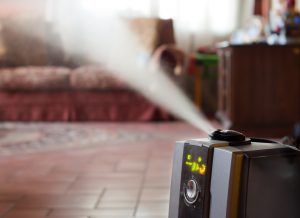 Winter means cooler temperatures, which also means dry air, and if you’ve ever felt the wind blow outside your home on a dry, blustery day, you can attest to what that dry air can do. During the colder months, we rightfully focus on our heating system and ensuring that the temperature in our homes is kept comfortable. But that’s not the only factor that goes into keeping our homes comfortable, and if you feel the sting of dry air this winter, it pays to look into a whole-house humidifier to treat it.
Winter means cooler temperatures, which also means dry air, and if you’ve ever felt the wind blow outside your home on a dry, blustery day, you can attest to what that dry air can do. During the colder months, we rightfully focus on our heating system and ensuring that the temperature in our homes is kept comfortable. But that’s not the only factor that goes into keeping our homes comfortable, and if you feel the sting of dry air this winter, it pays to look into a whole-house humidifier to treat it.
You’re likely accustomed to the concept of humidifiers already. Small units can be used to help treat people with respiratory illnesses, or to keep indoor plants healthy. A whole-house model simply applies the concept to the entire home: blowing moisture into the air from your furnace and raising the relative humidity levels in the process. How does that benefit your home? Read on for the answers.
Relative Humidity
Relative humidity is a convenient way of determining how much moisture is in the air, measured as a straight percentage. At 100% humidity, you basically have rain. At 0% humidity, you have no moisture whatsoever, something that rarely happens on planet Earth. Human beings tend to be most comfortable when the relative humidity sits between 30% and 50%.
Unfortunately, that percentage tends to go down when the weather gets cold. If you recall science class in school, lowering the temperature causes the ambient moisture in the air to shift from a gaseous state to a liquid state. It basically coalesces into droplets, which is why you get dew on the ground in the cool early hours of the morning. That, in turn, leaves the air much drier, and can cause considerable problems as a result.
What Kind of Problems?
Problems from low humidity can include, but are not limited to, the following:
- Dry Skin. Dry air will leech the moisture off of your skin, leaving it feeling itchy and cracked. It will also cause your lips to feel chapped and can cause more serious health concerns in the worst cases.
- Increased Risk of Illness. Dry air also dries out your mucous membranes, which is one of your body’s primary defenses against colds and other illnesses. That’s one of the reasons why you see an increase in illness during the winter: something a humidifier can help protect your family against.
- Static Electricity. No one likes those painful shocks when you walk across a rug and touch a piece of metal. Static electricity increases when the air is drier.
- Higher Heating Bills. Dry air tends to feel cooler than moist air, which means your heating system is going to have to work much harder to do its job. That means both higher monthly bills and an increased risk of a breakdown as the individual components are put under excess strain.
If you’d like a new humidifier in your Plano, TX home, or you have an existing humidifier that could use some attention, call the pros at Hutchins Plumbing & Air Conditioning today!









